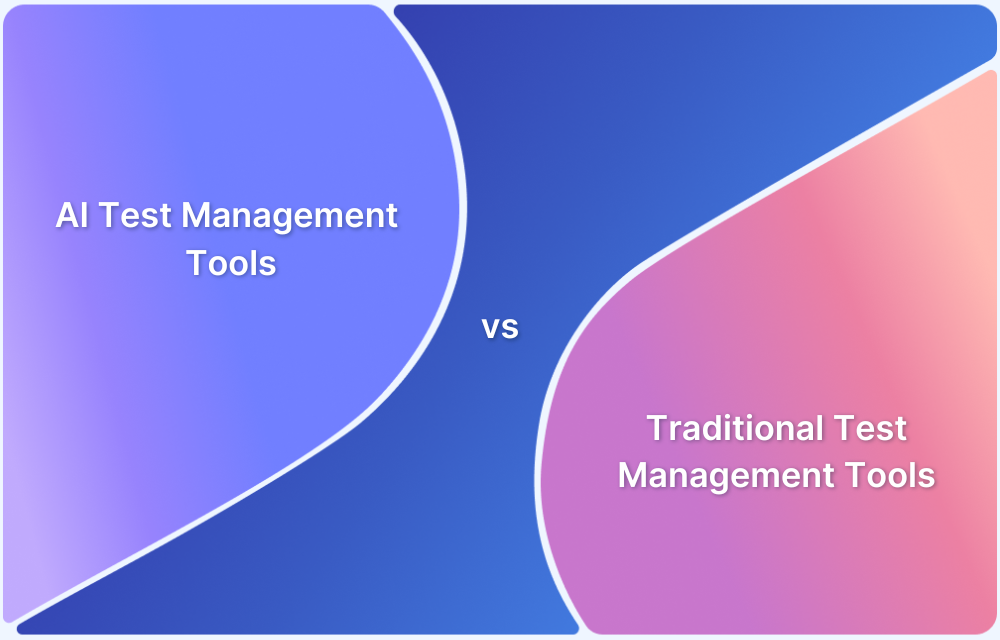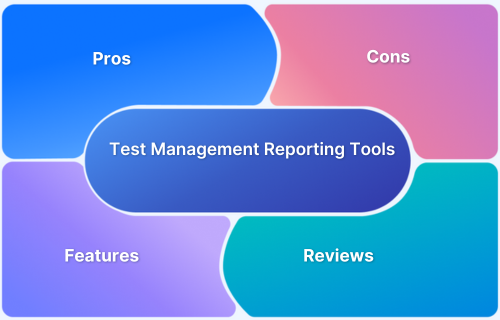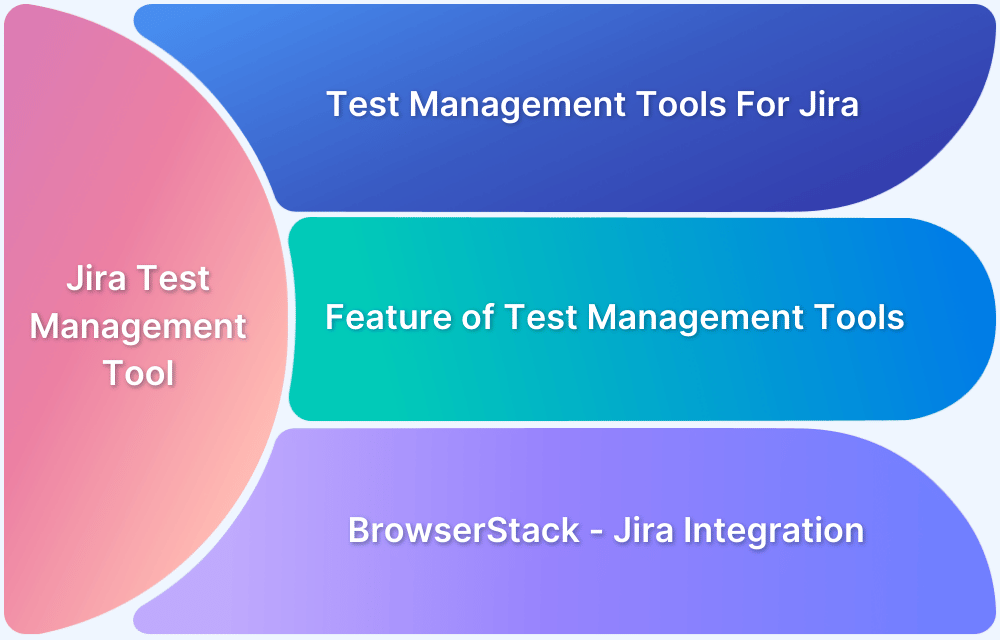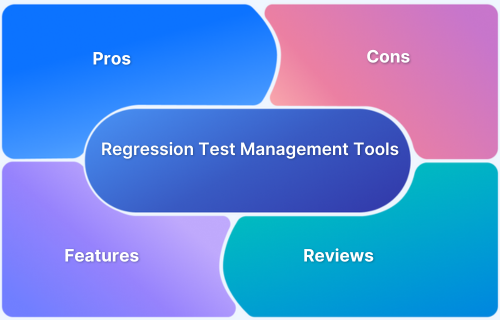Software testing has come a long way from spreadsheets to traditional test management tools and now to AI-powered platforms. Each stage reflects how teams adapt to faster releases and growing complexity.
Traditional tools provide structure and consistency, but often slow down in Agile and DevOps environments. AI test management tools, on the other hand, bring automation, predictive insights and more intelligent decision-making.
Overview
AI vs. Traditional Test Management Tools
- Test Case Generation: AI tools auto-generate test cases; traditional tools rely on manual scripting.
- Maintenance: AI offers self-healing tests; traditional tools need frequent manual updates.
- Adaptability: AI adapts to changes dynamically; traditional tools follow static logic.
- Execution Speed: AI optimizes and runs tests faster; traditional tools are slower and sequential.
- Test Coverage: AI expands coverage intelligently; traditional tools miss edge cases.
- Defect Detection: AI predicts defects proactively; traditional tools detect reactively.
- Setup & Skills: AI tools need higher setup and AI skills; traditional tools need manual effort.
- Best Use Case: AI suits agile, evolving apps; traditional tools fit stable, low-change projects.
This article compares AI test case management tools vs traditional tools, highlighting their features, challenges and why AI is becoming the future of test management.
AI Test Management vs Traditional Test Management
Traditional test management tools focus on structure and documentation. They allow teams to create, organise and track test cases, but much of the effort still depends on manual work. These tools are reliable but can feel slow when projects demand speed and flexibility.
AI test management tools, in contrast, use machine learning and automation to reduce repetitive tasks and provide predictive insights. Instead of just recording test cases, they help prioritise, suggest improvements and even identify risks before they occur.
This fundamental difference between manual control and intelligent assistance highlights why organisations are reevaluating their approach to software testing today.
What are Traditional Test Management Tools?
Traditional test management tools are software platforms that help teams systematically organize, execute, and monitor their testing processes throughout the software development lifecycle.
These tools act as a centralized hub, allowing testers to create detailed test cases, record execution results, and document defects all in one place.
They became essential as software projects increased in scope and complexity, providing a structured environment for planning, designing, and tracking tests.
By giving teams visibility and control over their testing activities, traditional tools help ensure higher product quality while streamlining collaboration and communication among testers, developers, and stakeholders
Features of Traditional Test Management Tools
Some of their common features include:
- Test case creation and organisation: Teams can write detailed test cases, group them by modules and manage them in a structured way.
- Test planning and scheduling: These tools allow setting timelines, assigning responsibilities and tracking progress.
- Defect tracking and reporting: Test results and bugs can be recorded, linked and monitored until resolution.
- Collaboration support: Multiple team members can access the same platform by making sharing updates easier and staying aligned.
- Integration with development tools: Many traditional tools connect with project management or version control systems by helping keep testing tied to development.
Importance of Traditional Test Management Tools
Traditional test management tools have been essential for many years because they bring order and consistency to testing. They make sure test cases are written, tracked and completed in an organised way, which helps teams avoid mistakes and keep software quality high.
These tools also give testers, developers and managers a shared place to work together, while reports and dashboards show progress, defects and overall quality.
In finance, healthcare and government industries, where rules and accuracy matter a lot, these tools are still trusted. They provide clear records and structured documentation, giving organisations reliability and transparency even if they do not have the automation and intelligence that AI-powered tools now offer.
Challenges of Traditional Test Management Tools
While traditional test management tools provide structure and reliability, they also come with several limitations:
- High manual effort: Creating and updating test cases takes time and human effort.
- Slow for modern projects: They can struggle to keep up with fast Agile and DevOps cycles.
- Difficult to scale: Maintaining large test repositories becomes complex as projects grow.
- Limited insights: They record data but cannot predict risks or suggest improvements.
- Cost of maintenance: Keeping these tools updated and integrated with other systems can be resource-heavy.
Top Traditional Test Management Tools
Over the years, several traditional test management tools have become popular among QA teams. Some of the most widely used include:
- Jira with Xray: Adds test management features on top of Jira, making it easy to connect testing with project tasks.
- Zephyr: Offers end-to-end test management with real-time dashboards.
- HP ALM (Application Lifecycle Management): A powerful enterprise solution often used in large organisations for compliance-heavy projects.
- qTest: Designed for Agile teams, offering test case management and integration with development tools.
Also Read:Top 11 Regression Test Management Tools
What are AI Test Management Tools?
AI test management tools are modern platforms that use artificial intelligence to make testing faster and smarter. Instead of depending only on manual work, these tools can analyse patterns, suggest improvements and even predict risks before they happen.
They are designed to reduce repetitive tasks, improve accuracy and give teams better insights into software quality. By combining automation with intelligent decision-making, AI test management tools help organisations deliver reliable software more quickly and with less effort.
Features of AI Test Management Tools
Some of their key features include:
- Automated test case generation: AI can create test cases based on requirements or past test data, saving time for teams.
- Predictive defect analysis: These tools can highlight areas most likely to fail, helping teams focus on high-risk parts of the application.
- Intelligent test prioritisation: AI suggests which tests should be run first to speed up releases without missing critical checks.
- Natural language processing (NLP): Some tools allow writing tests in plain English, making it easier for non-technical members to contribute.
- Smart dashboards and insights: Data is turned into easy-to-read visuals and recommendations, improving decision-making.
Importance of AI Test Management Tools
AI test management tools are becoming essential as software projects move faster and grow more complex. They help teams reduce repetitive manual work by saving time and improving accuracy. By learning from past data, these tools can identify risks early and guide teams to focus on the most critical tests.
They also fit perfectly with modern practices like Agile and DevOps, where speed and continuous delivery are critical. With intelligent dashboards and predictive insights, managers can make better decisions, release software faster and still maintain high quality.
Experts believe the shift to AI test management is certain because it makes testing quicker and smarter.
Top AI Test Management Tools
AI-powered test management tools are especially valuable for teams working in Agile or DevOps environments, where speed, adaptability, and accuracy are critical.
Here are some of the leading platforms in this space:
1. BrowserStack Test Management
BrowserStack Test Management is an AI-powered, unified platform designed to accelerate test case creation, execution, and automation with up to 90% faster test authoring and 50% improved coverage.
It offers seamless integrations, real-time visibility through customizable dashboards, and advanced AI agents that streamline testing workflows for both manual and automated tests.
Built for teams of all sizes, it ensures secure data handling while enabling high-quality, efficient software delivery.
Key Features of BrowserStack Test Management:
- AI-Powered Test Case Creation: Automatically generate comprehensive test cases from Product Requirement Documents (PRDs), user stories, or text prompts. AI also suggests enhancements to existing test cases, reducing manual effort significantly.
- Test Deduplication Agent: Detects exact or semantically similar test cases across your repository, providing intelligent recommendations for merging or removal to maintain a clean and efficient test suite.
- Low-Code Automated Test Authoring: Quickly convert manual test cases into low-code automated tests to accelerate automation adoption without requiring deep coding skills.
- Intelligent Test Selection Agent: Uses AI to identify and recommend the most relevant tests for execution, optimizing test runs and focusing on critical test coverage.
- Unified Test Management: Manage all manual and automated test cases in one centralized platform with full traceability from requirements to defects through seamless integrations with Jira, Azure DevOps, and more.
- Powerful Dashboard Analytics: Access customizable dashboards that offer real-time insights, track release status, monitor historical trends, and visualize testing metrics, including automation coverage.
- Shared Steps for Reusability: Mark repetitive test steps as shared within test cases to enhance reusability and save effort when creating or maintaining test cases.
- Quick Import & Custom Field Mapping: Import test cases rapidly from CSV files or existing management tools with automatic field mapping and on-the-fly custom field creation.
- AI-Powered Jira App with Two-Way Binding: Synchronize test cases and runs between BrowserStack Test Management and Jira, allowing management from both platforms with AI-driven assistance.
- Streamlined Manual and Automated Test Runs: Plan and execute test runs across manual and automated tests. Supports dynamic test inclusion and uploading automation results from frameworks like JUnit and BDD-JSON.
- Enterprise-Grade Security & Access Control: Role-based access management, geo-region restrictions, and encrypted real-time data processing ensure compliance and secure multi-team collaboration.
The free version of BrowserStack Test Management offers unlimited test cases, robust integrations, and real-time reporting capabilities.
Try BrowserStack Test Management
2. Aqua Cloud
Aqua Cloud is a flexible test management platform that combines traditional functionality with AI features. It helps teams to improve collaboration, accuracy and efficiency.
Key Features:
- AI-driven test case suggestions.
- Advanced reporting and analytics.
- Integration with CI/CD pipelines and project tools.
Pros:
- It can be easily adjusted for different team needs.
- It provides strong reporting and clear documentation support.
Cons:
- Setup can feel complex for new users.
- Pricing may be high for small companies.
3. TestRigor
TestRigor is a no-code AI-powered platform that allows teams to create tests in plain English. It helps reduce dependency on technical scripting and speeds up test creation.
Key Features:
- Write tests using natural language commands.
- Automates functional and regression testing.
- Works across web, mobile and desktop applications.
Pros:
- Easy for non-technical team members to contribute.
- Reduces time spent on script maintenance.
Cons:
- May have a learning curve for large projects.
- Advanced features can feel overwhelming at first.
Must Read: 25 Best Free Test Management Tools for 2025
4. PractiTest
PractiTest is an end-to-end test management solution that uses SmartFox AI to improve visibility and decision-making. It helps the teams to manage tests, track the results and align QA with business goals.
Key Features:
- Real-time dashboards with AI-driven insights.
- End-to-end traceability across requirements, tests and defects.
- Strong integration with project and CI/CD tools.
Pros:
- Provides deep analytics for better planning.
- Offers strong compliance and audit support.
Cons:
- Can feel complex for smaller teams.
- Pricing may be higher compared to lightweight tools.
5. iHarmony
iHarmony is an AI-powered test management platform that focuses on optimising test execution. It helps the teams to identify risks early and improve testing efficiency.
Key Features:
- Predictive defect analysis to spot high-risk areas.
- Risk-based test recommendations for smarter coverage.
- Dashboards that highlight quality trends.
Pros:
- Helps teams focus on the most critical tests.
- Improves efficiency with AI-driven insights.
Cons:
- Still a relatively new platform in the market.
- It may lack some advanced features compared to mature tools.
Read More:17 Best Test Management Tools For Jira
AI Test Management Tools vs Traditional Test Management Tools: A Quick Overview
AI test management tools and traditional test management tools differ in how they approach speed, intelligence and scalability. Traditional tools focus on structure and documentation, while AI tools add automation and smart insights to keep pace with modern development.
| Aspect | Traditional Tools | AI Tools |
| Ease of Use | Require manual setup, configuration, and updates. | Automate setup, suggest improvements, and simplify workflows. |
| Speed | Slower, especially in Agile/DevOps environments. | Optimized for rapid, continuous testing cycles. |
| Insights | Provide basic reports and static dashboards. | Deliver predictive analytics, trend insights, and risk-based recommendations. |
| Cost Efficiency | High maintenance effort increases long-term costs. | Reduces time, resources, and overall operational costs. |
| Scalability | Hard to manage large test repositories or distributed teams. | Easily scales with AI-driven automation and smart test management. |
| Test Case Generation | Manual test case creation based on fixed requirements. | Auto-generates test cases from requirements, user stories, or real usage data. |
| Maintenance | Frequent manual updates when applications change. | Self-healing scripts automatically adapt to UI or logic changes. |
| Adaptability | Static and brittle; struggles with evolving systems. | Continuously learns and adapts using machine learning. |
| Defect Detection | Reactive, bugs are found during test runs. | Predictive, identifies high-risk areas before issues occur. |
| Integration | Limited integrations with modern DevOps tools. | Seamlessly integrates across CI/CD pipelines and popular platforms. |
| Collaboration | Dependent on manual sharing or sync processes. | Centralized dashboards and AI summaries enhance team collaboration. |
| Best Use Case | Ideal for stable apps with infrequent changes. | Best for dynamic, fast-evolving projects in Agile/DevOps setups. |
Why AI Test Management Tools are Better than Traditional Test Management Tools
AI test management tools solve the key problems of traditional tools by automating repetitive work, reducing errors and providing predictive insights. This allows teams to focus on high-risk areas, improve quality and release software faster.
They also fit better with Agile and DevOps, where continuous testing is required. Instead of managing large test repositories manually, AI platforms scale easily, cut maintenance effort and lower long-term costs.
Experts agree that the shift to AI test management is the future, as it combines speed and intelligence to give organisations a clear competitive edge.
Conclusion
Traditional tools gave structure to testing, but they struggle to keep up with today’s fast-paced development. AI test management tools change this by adding automation, smart insights and speed by making testing both faster and smarter.
The future clearly belongs to AI-powered platforms, with solutions like BrowserStack Test Management already leading the way. Teams that adopt them now will be ready for tomorrow’s challenges.







